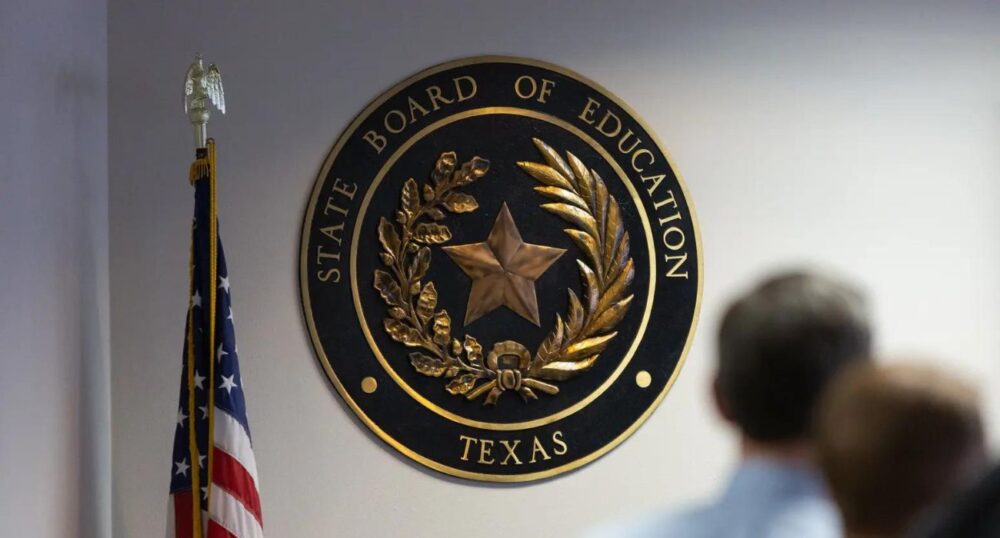The Texas State Board of Education heard nearly eight hours of public testimony on Tuesday about proposed instructional materials that reference religious teachings.
Speakers voiced their opinions about the potential addition of religious material, mainly biblical references, to the public school curriculum for grades K-5, with the majority expressing opposition. However, the curriculum under consideration would not be mandatory for public school systems across the state. Rather, it would be an optional program that school districts could adopt in return for an additional $60 in state taxpayer money per student.
“I’m an American, a Jew, and a person that believes in the power of education to bring people together to let people learn from each other,” said Rabbi Nancy Kasten. “I rely on the government to teach that no religion is more important than the other. This doesn’t mean that our schools can’t teach about religious texts, but it must be unbiased. Students must be old enough to understand the difference between history and narrative; K-5 students are not.”
Kasten claimed that the proposed texts portray Jews as opponents of Christ, something that could possibly feed antisemitism in Texas.
Board Member Tom Maynard (R-Florence) responded, “There are some things that are historical. … The Jewish people have been targeted a lot, and I don’t think we necessarily have to hide from that, but I think how we present that is important.”
Public speaker Emily Bourgeois agreed, stating, “Students of all backgrounds deserve to see themselves reflected in the curriculum.” She called for an “inclusive approach” to the history of Jewish people and religion in the curriculum.
Others disagreed with the curriculum because they claimed it would strain already stressed teachers who are not qualified to teach religious material. Teachers would have to do additional work, some argued, which may push them out of the profession amid all-time high attrition rates.
“You can teach reading, and you can teach religion, but there’s a loss of teacher excellency when you try to combine,” claimed Amy Leisinger. “Some teachers aren’t eager enough to be up to the task. The proposed curriculum has an underlying Christian bias that it is inherently moral and correct.”
Additionally, many said that children are too young and impressionable to discern between Christian texts being presented as truth or simply historical documents.
“I support public schools teaching about religion, including the Bible, in legal, age-appropriate ways,” said Mark Chancey, a professor of religious studies at Southern Methodist University. “Unfortunately, these materials do not do that. They promote particular religious views to impressionable children. They promote Jesus and Christianity more than other religions. That’s not teaching about religion, that is promoting particular religious beliefs.”
Chancey said the texts are an overstep for parents who want to teach children about religion themselves.
Texas public school educator and ordained Baptist minister Jonathan Greer made similar remarks.
“As I look at the proposed material, I’m discouraged to see a Christian influence. This has nothing to do with how the stories have a meaning to my personal faith. The struggle is this has something to do with our public schools. Faith communities are already doing the job of faith education. There’s no reason for public schools to teach these beliefs,” Greer said.
Although the majority who spoke before the board opposed the inclusion of religious material in the curriculum, some showed up to voice their approval.
“Nine out of 10 homes have a Bible in America. You can read literature, you can learn historical traits, you can learn more about law and man-made law,” said Cindy Castillo.
Board Member Staci Childs (D-Houston) asked Castillo, “You don’t think the kids would think they have to believe in God to be successful due to the teachings?”
Castillo responded, “That’s the parent’s job. Our history is our history, and I’m good with that. In early history, there’s not a lot of Islamic history [in America], there’s not a lot of Hindu history here. Way back, there was a lot of Christianity here.”
“Since the Bible was taken out [of the classroom] in 1962, I think we’re seeing the ramifications of that. We’re having discipline problems; teachers are falling out. Education used to be about wisdom and teaching the Bible,” added Tammy Fogle. “What I think is so important about this curriculum is it starts to restore the lack of wisdom in this country.”
SBOE members will take a final vote in November on the proposed materials.
Many board members said they would contact people who spoke during public testimony on both sides of the issue to collaborate on editing the curriculum.
“I’m in favor of having stories we all understand,” said Board Member Will Hickman (R-Houston). “Common cultural references, such as why Chick-fil-A is closed on a Sunday. Those are more a story than a Sunday school teaching.”
Board Member Julie Pickren (R-Pearland) said that despite the seemingly negative response from most of the speakers throughout the day, she has received 12,000 emails in support of including religious material in the curriculum.
The State Board of Education will continue to meet throughout the week in Austin. A live stream of the meetings can be watched here.


